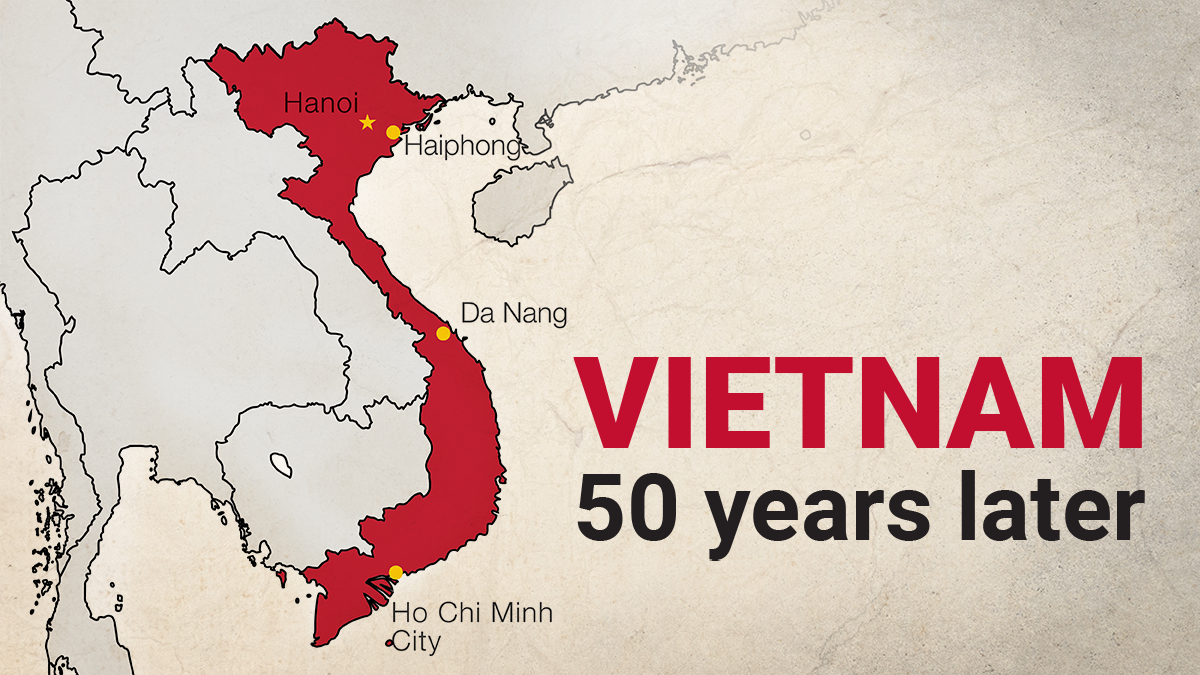April 29, 2025
Fifty years ago today, North Vietnamese troops seized Saigon, and ended the Vietnam war with a communist victory. GZERO writers and producers have taken a deep dive into the history behind this solemn occasion, exploring life in Saigon during the war, the emotional and chaotic scenes that unfolded as thousands fled, the life Vietnamese-Americans built from scratch in their new homes, and asking whether we have learned the lessons of the war.
50 Years on, have we learned the Vietnam War's lessons?
Fifty years after the fall of Saigon (or its liberation, depending on whom you ask), Vietnam has transformed from a war-torn battleground to one of Asia’s fastest-growing economies — and now finds itself caught between two superpowers. Ian Bremmer breaks down how Vietnam went from devastation in the wake of the Vietnam War to become a regional economic powerhouse.
Saigon’s Last Day: The fall, the flight, and the aftermath of the Vietnam War
Don Shearer, US Defense Department via National Archives
Saigon, April 29, 1975. For six weeks, South Vietnamese forces have been falling back in the face of a determined communist offensive. American troops have been gone for two years. The feeble government is in disarray. The people are traumatized by three decades of war and three million deaths.
Bing Crosby’s “White Christmas” begins playing on radios across the capital.
Some Saigonese know it’s a sign: It is time to run.
Lien-Hang T. Nguyen, now a Columbia University history professor, was just five months old, the youngest of nine children. After a failed first escape attempt by helicopter, her family heard about an uncle with access to an oil transport boat. More than 100 refugees crammed aboard the small vessel, where they waited for hours to set sail. Nguyen’s father nearly became separated when he dashed back into the city in a futile attempt to find more relatives.
At nightfall, they finally departed, crossing enemy-controlled territory under cover of darkness before being ordered onto an ammunition barge floating off the coast, bursting with over 1,000 refugees.
“When the sun rose the next day, April 30, we realized Saigon had fallen,” says Nguyen.
Read more about the amazing stories of survival, and just what happened to Vietnam after the war here.
PODCAST: Revisiting the Vietnam War 50 years later, with authors Viet Thanh Nguyen and Mai Elliott
On the GZERO World Podcast, two authors with personal ties to the Vietnam War reflect on its enduring legacy and Vietnam’s remarkable rise as a modern geopolitical player.
Life in Saigon during the Vietnam War
On GZERO World with Ian Bremmer, author Mai Elliott recalls how witnessing the human toll of the Vietnam War firsthand changed her views — and forced her to keep a life-altering secret from her own family.
Growing up as a Vietnamese refugee in 1980s America
On GZERO World with Ian Bremmer,Pulitzer Prize-winning author Viet Thanh Nguyen shares what it was like growing up as a Vietnamese refugee in the US — and how the Americans around him often misunderstood the emotional toll of displacement.
More For You
Prime Minister Narendra Modi, with President of the European Council António Luís Santos da Costa, and President of the European Commission Ursula von der Leyen, at Hyderabad House, in New Delhi, India, on Jan. 27, 2026.
DPR PMO/ANI Photo
On Tuesday, the world’s largest single market and the world’s most populous country cinched a deal that will slash or reduce tariffs on the vast majority of the products they trade.
Most Popular
Sponsored posts
Five forces that shaped 2025
What's Good Wednesdays
What’s Good Wednesdays™, January 28, 2026
Mexican President Claudia Sheinbaum Pardo stands alongside Canadian Prime Minister Mark Carney and US President Donald Trump during the 2026 World Cup draw at the John F. Kennedy Center for the Performing Arts in Washington, D.C., on December 5, 2025.
Deccio Serrano/NurPhoto
Canadian Prime Minister Mark Carney has repeatedly tussled with US President Donald Trump, whereas Mexican President Claudia Sheinbaum has tried to placate him. The discrepancy raises questions about the best way to approach the US leader.
Fighters of the Qassam Brigades, the armed wing of the Palestinian Islamist Hamas movement, attend a rally marking the 35th anniversary of the group's foundation in Gaza City on December 14, 2022.
Photo by Majdi Fathi/NurPhoto
10,000: The number of Hamas officers that the militant group reportedly wants to incorporate into the US-backed Palestinian administration for Gaza, in the form of a police force.
Walmart is investing $350 billion in US manufacturing. Over two-thirds of the products Walmart buys are made, grown, or assembled in America, like healthy dried fruit from The Ugly Co. The sustainable fruit is sourced directly from fourth-generation farmers in Farmersville, California, and delivered to your neighborhood Walmart shelves. Discover how Walmart's investment is supporting communities and fueling jobs across the nation.
© 2025 GZERO Media. All Rights Reserved | A Eurasia Group media company.
